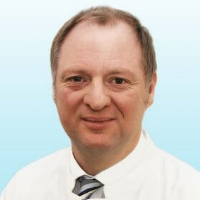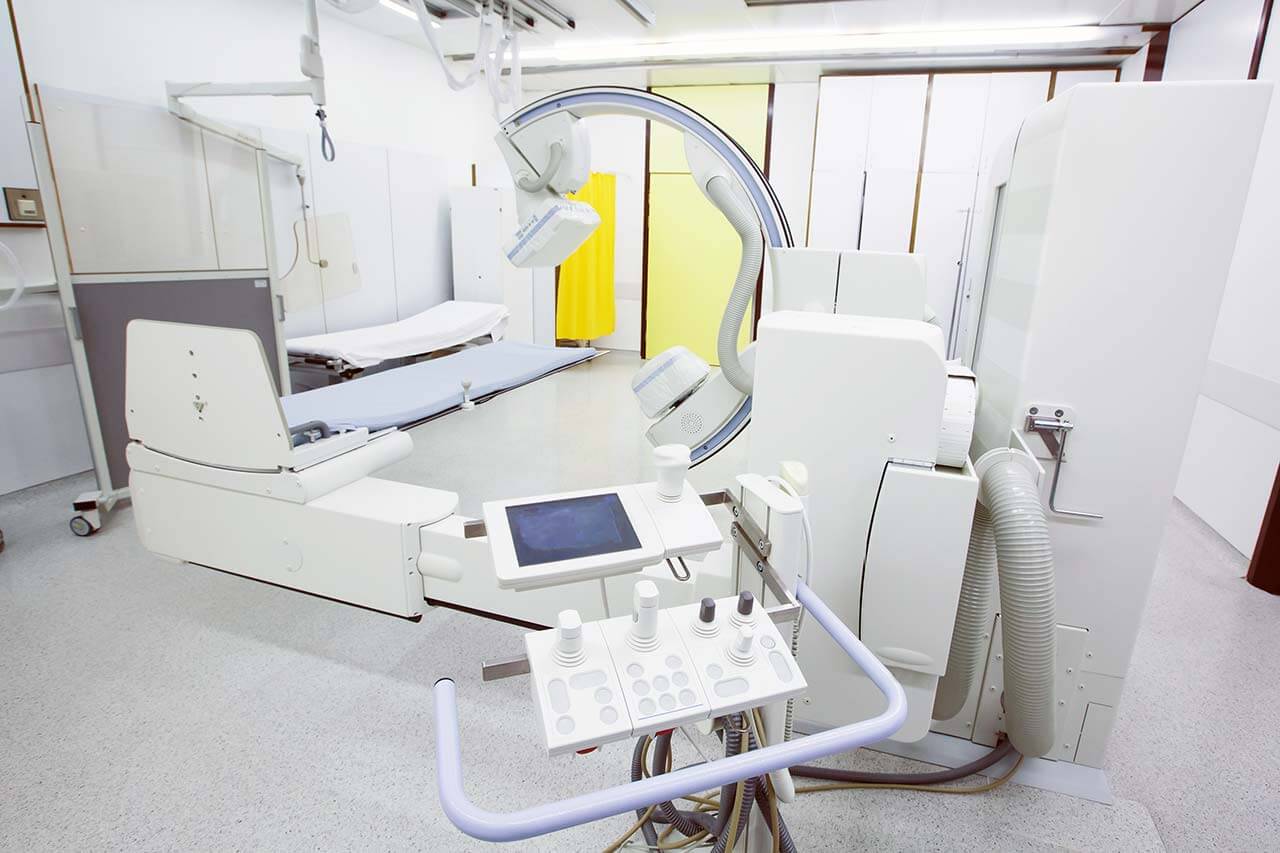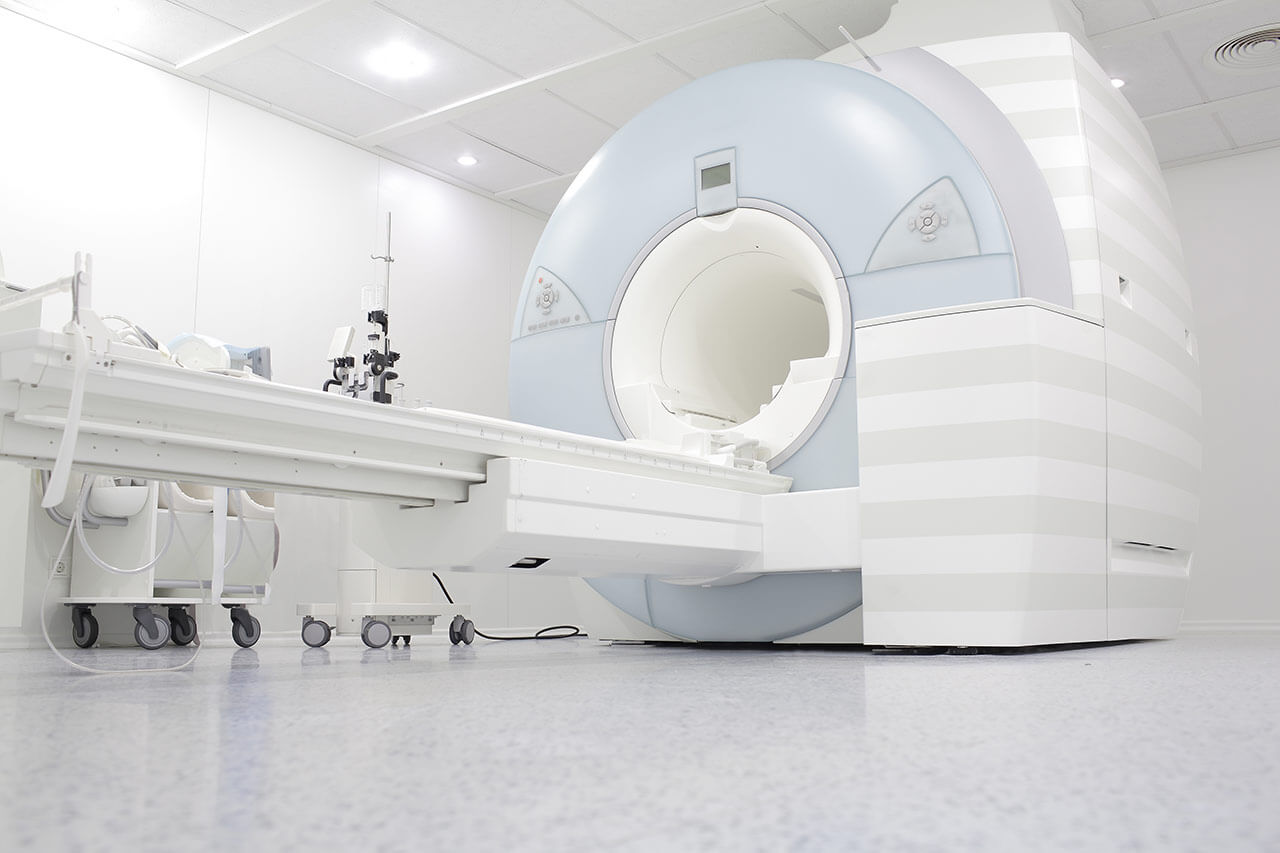
The program includes:
- Initial presentation in the clinic
- clinical history taking
- review of medical records
- physical examination
- ophthalmologic examination
- laboratory tests:
- complete blood count
- biochemical analysis of blood
- TSH-basal, fT3, fT4
- tumor markers
- inflammation indicators
- indicators blood coagulation
- ultrasound of the eye
- CT/MRI scan of the head
- preoperative care
- eyeball removal (enucleation)
- symptomatic treatment
- control examinations
- the cost of essential medicines and materials
- nursing services
- full hospital accommodation
- explanation of future recommendations
Required documents
- Medical records
- MRI/CT scan (not older than 3 months)
- Biopsy results (if available)
Service
You may also book:
 BookingHealth Price from:
BookingHealth Price from:
About the department
The Department of Adult and Pediatric Ophthalmology at the Hannover Medical School offers the full range of medical services to patients with diseases of the eyes and their appendages. The department's highly qualified doctors provide treatment to both adults and children. The scope of competence of the medical team includes diagnostic tests, conservative and microsurgical treatment of ophthalmic pathologies of any severity. The department also admits patients who need emergency ophthalmic care. More than 3,700 inpatients and about 22,000 outpatients undergo treatment in the department annually. The medical facility has three operating rooms equipped with state-of-the-art technology. One of the operating rooms is designed for outpatient procedures. The team of the department's doctors annually performs more than 4,000 ophthalmological procedures, so it can be deservedly proud of its rich and unique clinical experience. The hospital has 33 beds for patient hospitalization. The entire staff of the medical facility cares about the high quality of medical services and the maximum comfort of patients.
The department is headed by Prof. Dr. med. Carsten Framme. According to the reputable Focus magazine, the professor is ranked among the best German ophthalmologists! The specialist has been heading the department since 2012 and during this time he has helped thousands of patients restore their eyesight and see the world in bright colors. The professor has a perfect command of all modern treatment methods for ophthalmic diseases and monitors innovations in this medical field.
The main areas of the department's clinical activity include both drug and surgical treatment of retinal and macular diseases, corneal disease, as well as the treatment of glaucoma and cataracts. For these purposes, the very latest medical technologies are available here, including vitrectomy (removal of the vitreous body) using 23G and 25G vitrectomy without suturing, selective laser trabeculoplasty (SLT), trabeculoplasty for glaucoma treatment, perforating keratoplasty (corneal transplantation), transplantation of the inner corneal layers (DMEK), crosslinking for keratoconus and many other treatment methods. In addition, the department's priority focus is on the correction of strabismus in adults and children.
It is no secret that accurate diagnostics is the key to successful treatment. As of today, the department offers the very latest methods of imaging diagnostics, as well as innovative systems, which can be used to record, analyze and compare examination results. The department employs specially trained, experienced doctors with additional qualifications in the field of imaging diagnostics, which guarantees one hundred percent accuracy of the diagnosis. In addition, the examination results are digitally stored and available to all doctors in the department.
The department's therapeutic options include conservative treatment (use of eye drops, systemic treatment with various groups of medicines), surgical treatment of the eyelids and orbits (interventions are performed without damaging the eyeball; for example, correction of droopy eyelids, removal of excess eyelid skin, removal of periorbital tumors and eye enucleation), surgical treatment of the anterior segment of the eye (typical operations include corneal transplantation, surgical treatment of glaucoma and cataracts) and surgical treatment of the posterior segment of the eye (typical operations include interventions for the treatment of retinal detachment, peeling of the epiretinal membrane, placement of subretinal implants).
The department's range of diagnostic and therapeutic services includes:
- Diagnostic examinations
- Objective refractometry, including examination of the corneal radius of curvature
- Sonography (A-mode, B-mode, ultrasound biomicroscopy, calculation of the size of an intraocular lens using sonography)
- Schirmer's test
- Examinations for anisocoria (including 1%/0.1% pilocarpine examinations)
- Measurement of the number of endothelial cells
- Orthoptic service
- Orthoptic status
- Use of prisms
- Skiascopy
- Molecular genetic testing
- Electrooculography
- Electrophysiological tests (for example, multifocal electroretinography, electrooculogram, VEP)
- Other examinations
- Spectral optical coherence tomography
- Anterior segment of the eye: corneal imaging, assessment of lamellar keratoplasty, examination of changes in the conjunctiva, iris, monitoring of the size and growth intensity of small tumors
- Posterior segment of the eye: retinal imaging with the analysis of separate retinal layers, monitoring of subsequent changes in retinal thickness, diagnostics and monitoring of retinal edema and macula, diagnostics of congenital diseases
- Spectral optical coherence tomography with Heidelberg Spectralis (HRA + OCT)
- Infrared images
- Autofluorescence images of the fundus
- Multicolor images
- Fluorescent angiography (combined/isolated indocyanine green angiography)
- Integrated spectral optical coherence tomography
- Tomography of the anterior segment of the eye using the Pentacam system
- Corneal imaging/assessment of corneal thickness/assessment of corneal refractive power
- Testing of regular and irregular astigmatism
- Measurement of the anterior chamber depth
- Assessment of lamellar and perforating keratoplasty
- Keratoconus examination
- Optical wide angle imaging (posterior segment of the eye)
- Retinal imaging without dilated pupils
- Compilation of coherent images of the whole retina within a single procedure
- Recording of results and their assessment in dynamics
- Fluorescein angiography with blood flow imaging
- Heidelberg laser retina tomography with Rostock Cornea Module
- Diagnostics of corneal infections and the detection for pathogens of the genus acanthamoeba
- Assessment of corneal transplantation results
- Measurement of the number of endothelial cells as an index of endothelial function and graft health
- Optic nerve examination in patients with diabetes mellitus
- Visual field testing
- Visual field testing using the Goldman perimeter
- Visual field imaging using the Octopus-900 perimeter (Haag-Streit), especially for the detection of glaucoma and macular diseases
- Visual field testing using the Heidelberg Edge Perimeter
- Therapeutic options
- Laser surgery
- Argon laser interventions
- Interventions using neodymium laser (Nd: YAG laser)
- Selective laser trabeculoplasty
- Photodynamic therapy
- Surgical treatment of cataracts
- Computer-assisted cataract surgery
- Implantation of multifocal intraocular lenses
- Implantation of toric intraocular lenses
- UV crosslinking
- Corneal transplantation
- Perforating keratoplasty
- Lamellar keratoplasty (DMEK)
- Surgical treatment of glaucoma
- Laser interventions (for example, selective laser trabeculoplasty, YAG laser iridotomy, cyclophobic coagulation)
- Ab-interno trabeculotomy (also in combination with cataract surgery)
- Trabeculectomy with mitomycin C
- Vitrectomy (removal of the vitreous body) with 23G and 25G vitrectomy without suturing
- Placement of subretinal retinal implants
- Laser surgery
- Other diagnostic and treatment methods
Curriculum vitae
Higher Education and Postgraduate Training
- 1989 - 1996 Study of Medicine at the Hannover Medical School.
- 1996 Doctoral Degree. Thesis subject: "Pregnancy monitoring in blood group incompatibility".
- 1998 Admission to medical practice.
- 2006 Venia Legendi in Ophthalmology (PD). Paper subject: "New experimental and clinical studies on selective laser therapy for retinal pigment epithelium".
- 2008 Master of Business Administration (MBA), special higher education institutions of Neu-Ulm and Hanover. Subject of the Master’s Thesis: "Calculation of the cost and reward for surgical treatment of diseases of the posterior eye segment and open eye injuries according to the requirements of the Diagnosis Related Group (DRG) in the Department of Ophthalmology of the University Hospital Regensburg, 2005 - 2007".
- 2010 Appointed as Professor of Ophthalmology, University of Bern, Switzerland.
- 2012 Managing W3 Professor, Hannover Medical School.
Qualifications
- Medical Specialist in Ophthalmology, Bavarian Medical Association, Munich.
- 2004 European Medical Specialist in Ophthalmology, FEBO, Paris.
- 2007 Medical Manager (MHM®), Hanover University of Applied Sciences.
- 2008 Master of Business Administration (MBA), University of Applied Sciences in Neu-Ulm.
- 2010 Medical Specialist in Special Ophthalmic Surgery (Switzerland).
Professional Career
- 1996 Intern in the Department of Adult and Pediatric Ophthalmology at the Hannover Medical School.
- 1996 - 1998 Assistant Physician in the Department of Ophthalmology at the University Hospital Luebeck.
- 1998 - 2002 Assistant Physician in the Department of Ophthalmology of the University Hospital Regensburg, Research in the Medical Laser Center of the University of Luebeck and Wellman Laboratories of Photomedicine, Massachusetts General Hospital, Harvard Medical School, Boston, Massachusetts, USA.
- 2003 - 2007 Senior Physician of the Department of Ophthalmology at the University Hospital Regensburg.
- 2008 - 2009 Leading Senior Physician and Deputy Head of the Department of Ophthalmology at the University Hospital Regensburg.
- 2009 - 2012 Leading Physician of the Department of Ophthalmology at the University Hospital Inselspital Bern, Switzerland.
- Since 2012 Head of the Department of Adult and Pediatric Ophthalmology at the Hannover Medical School.
Awards and Honors
- 2005 Bausch & Lomb Research Award of the German Ophthalmological Society.
- 2009 Leonard Klein Award.
Research Focuses
- Experimental and clinical evaluation of surgical treatment and laser therapy for vitreous and retinal diseases.
- Treatment of age-related macular degeneration and diabetic retinopathy.
- Retinal imaging with the help of autofluorescence and optical coherence tomography (OCT).
- Business administration in the clinic.
Photo of the doctor: (c) Medizinische Hochschule Hannover (MHH)
About hospital
The Hannover Medical School has the status of a leading German medical facility. The advanced medical technologies, highly qualified specialists, as well as productive research activities form a solid basis for top-class medical service of the world standard. The hospital is proud of its outstanding achievements in the treatment of cancer, diseases of the lung, heart, kidney, liver and metabolic disorders, as well as surgical diseases.
The medical facility diagnoses and treats more than 63,000 inpatients and about 470,000 outpatients annally. These indicators are growing steadily, which indicates the reputability and prestige of the hospital in the European medical arena.
For decades, the hospital has been a pioneer in transplantation medicine and is one of the leading centers of this specialization in the world. It performs about 400 transplantations of solid organs annually. Also, the hospital has performed over 130 bone marrow transplantations. In addition, the hospital ranks among the world leaders in cochlear implantation for the treatment of hearing loss.
Much attention is paid to interdisciplinary cooperation. Since 2016, the hospital has the largest certified Cancer Center in the Federal State of Lower Saxony, which provides comprehensive, multidisciplinary medical care in accordance with the standardized protocols of cancer societies.
The specialists of the hospital offer patients not only modern treatment of the highest quality, but also attentive care, sympathetic attitude to the patient's problems and understanding of his individual needs. Thus, the patient can be sure that his health is in the safe hands of highly qualified doctors.
Photo: (c) depositphotos
Accommodation in hospital
Patients rooms
The patients of the Hannover Medical School live in comfortable and cozy rooms. Each patent room has an ensuite bathroom with shower and toilet. A standard patient room includes an automatically adjustable bed with an orthopedic mattress, a bedside table, a wardrobe, a TV and a telephone. You can use TV, telephone and Internet using a special chip card, which can be purchased at self-service terminals or ordered at the service counter. The hospital allows the patients to use mobile phones, with the exception of intensive care units, some departments and diagnostic rooms.
If desired, the patient can stay in an enhanced-comfort room. Such rooms are distinguished by a more sophisticated design, and are additionally equipped with upholstered furniture, a safe for storing valuables and a mini fridge.
Meals and Menus
The patient and the accompanying person are offered delicious and balanced three meals a day. Breakfast and dinner are served buffet style and lunch can be chosen from three set menus. All dishes are prepared by professional chefs using the freshest ingredients available in the region.
If you are on a specific diet for some reason, you will be offered an individual menu. Please inform the medical staff about your dietary preferences prior to the treatment.
Further details
Standard rooms include:
Religion
There is a chapel on the territory of the hospital, where Christian and Catholic services are regularly held. The hospital provides a prayer room for followers of Islam, which is open for visits 24 hours a day.
Religious services can also be provided upon request.
Accompanying person
During an inpatient program, an accompanying person can stay with you in the patient room or in a hotel of your choice.
Hotel
During an outpatient program, you can stay in a hotel of your choice. The managers will help you choose the most suitable options.




